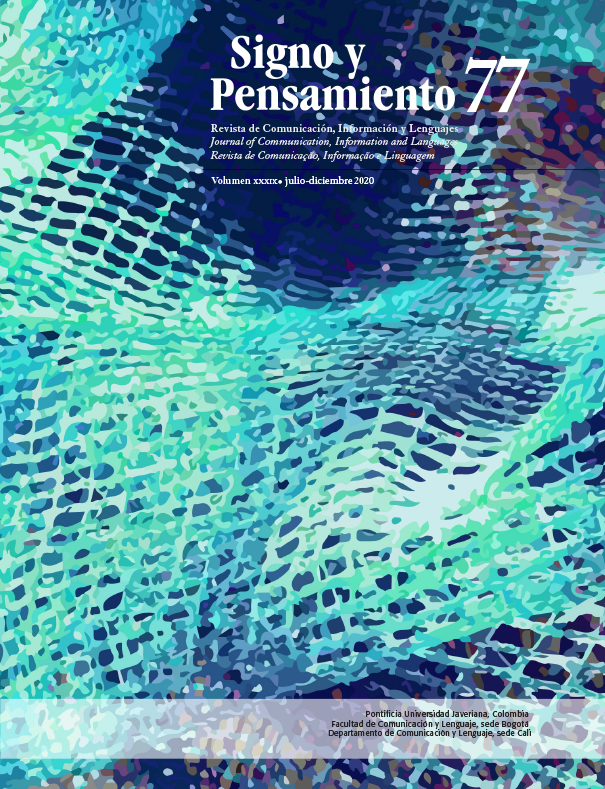Resumen
Este artículo da cuenta de un prototipo digital que indaga por la modificación recíproca entre comunidades de base y artefactos digitales a la vez que encarna hipótesis al respecto de cómo potenciar dicha modificación. Para ello, muestra las conexiones de dicho artefacto con movimientos de ciencia abierta, ciudadana y de garaje, de objetos activistas y de investigación y de la tecnopolítica del software libre. También considera elementos de diseño tenidos en cuenta para la creación del prototipo (auto-referencialidad y boostraping), así como metodológicos desde las apuestas del software como artesanía, como hipótesis y como manera de vincularse y conformar comunidades de práctica.
Activist Object. (2014). Curating the Activist Object. About the activist object. http://activistobject.wordpress.com/about/
Blackwell, A., & Aaron, S. (2015). Craft practices of live coding language design. En Proceedings of the First International Conference on Live Coding (pp. 41-52). Univeristy of Leeds. https://doi.org/10.5281/zenodo.19318
Bonsiepe, G. (mayo, 2000). Design as tool for cognitive metabolism: From knowledge production to knowledge presentation.En G. Bonsiepe (Ed.), trabajo presentado en el International Symposium on the Dimensions of Industrial Design Research, Politecnico di Milano, Italia.
Carretero, A. B. (2019). Comunicación, ciudadanı́a y cambio social. Diseño de un modelo de investigación y acción para democratizar la comunicación desde la noción de reforma mediática. Signo y Pensamiento, 38(75). https://doi.org/10.11144/javeriana.syp38-75.cccs
Coleman, G. (2013). Coding freedom. The ehics and aesthetics of hacking. Princeton University Press.
Colquhoun, D. (5 de septiembre de 2011). Publish-or-perish: Peer review and the corruption of science. The Guardian. https://www.theguardian.com/science/2011/sep/05/publish-perish-peer-review-science
Critical Art Emsamble. (2009). Ciencia de garaje-Medialab-Prado de Madrid. http://medialab-prado.es/article/garage_science
Denker, M. (2016). Perfection & Feedback Loops or: Why worse is better [Software de computación]. https://www.slideshare.net/MarcusDenker/perfection-feedback-loops-or-why-worse-is-better-65540840
Derickson, K. D., y Routledge, P. (2015). Resourcing scholar-activism: Collaboration, transformation, and the production of knowledge. The Professional Geographer, 67(1), 1–7. https://doi.org/10.1080/00330124.2014.883958
D’Ignazio, C., & Klein, L. F. (2020). Data feminism. The MIT Press.
Ducasse, S., Cassou, D., & Fabresse, L. (5 de junio de 2020). Pharo Vision [Archivo de video]. https://www.youtube.com/watch?v=I60_3QYBFQ4
Eghbal, N. (2016). Roads and Bridges: The Unseen Labor Behind Our Digital Infrastructure. https://www.fordfoundation.org/work/learning/research-reports/roads-and-bridges-the-unseen-labor-behind-our-digital-infrastructure/
Gruber, J. (2004). Markdown (1.0.1) [Computer software]. https://daringfireball.net/projects/markdown/
HackBo. (n.d.). :| hackbo |:. Un hackerspace en bogotá. Retrieved December 14, 2020, from https://hackbo.co/
Hill, B. M. (2013). When Free Software Isn’t Better. Libreplanet . https://www.youtube.com/watch?v=Er1pM9suxvE
Isin, E. F., & Ruppert, E. (2015). Being digital citizens. Rowman & Littlefield.
Jonas, W. (2004). Design theories and processes are evolutionary artifacts. In W. Jonas & J. Meyer-Veden (Eds.), Mind The Gap. On knowing and not-knowing in design (pp. 177-221). Hauschildt-Verlag.
Jonas, W. (2007). Design research and its meaning to the methodological development of the discipline. En R. Michel (Ed.), Design research now. Board of international research in design (pp. 187-206). Birkhäuser Basel. https://doi.org/10.1007/978-3-7643-8472-2_11
Kay, A. (1997). The computer revolution hasn’t happened yet. https://www.youtube.com/watch?v=oKg1hTOQXoY
Lafuente, A. (22 de septiembre de 2014). Amateurs, activistas y hackers: tres formas de estar en la ciencia [Mensaje en un blog]. https://www.diagonalperiodico.net/blogs/fuera-clase/amateurs-activistas-y-hackers-tres-formas-estar-la-ciencia.html
Luna Cárdenas, O. V. (2014). Repositorio de documentación de Grafoscopio. https://mutabit.com/repos.fossil/grafoscopio/
Luna Cárdenas, O.V. (2017). Grafoscopio user manual. Zenodo. https://doi.org/10.5281/ZENODO.1974261Luna Cárdenas, O. V. (2017a). Grafoscopio: A moldable tool for literate computing and reproducible research. The Journal of Open Source Software, 2(18), 251. https://doi.org/10.21105/joss.00251
Luna Cárdenas, O. V. (2017b). Grafoscopio user manual. http://mutabit.com/repos.fossil/grafoscopio/doc/aa76589d23/Docs/En/Books/Manual/manual.pdf
Luna Cárdenas, O. V. (2018). Codiseñar autonomías: artefactos digitales amoldables, hacktivismo y ciudadanías (Tesis doctoral inédita). Universidad de Caldas. https://mutabit.com/repos.fossil/doctorado-offray/.
Luna Cárdenas, O. V. (2018). Los prototipos: Entretegiéndose comunidades en y el artefactos quehacer. In Codiseñar Autonomías: Artefactos digitales amoldables, hacktivismo y ciudadanías (pp. 157–191). https://mutabit.com/repos.fossil/doctorado-offray/
Maxwell, J. W. (2006). Tracing the dynabook (Tesis doctoral inédita). University of British Columbia. https://open.library.ubc.ca/cIRcle/collections/ubctheses/831/items/1.0055157
researchobject.org. (s. f.). Research object overview. Goals, principles and mechanisms [overview]. University of Manchester. http://www.researchobject.org/overview/
Mit license. (2020). In Wikipedia. https://en.wikipedia.org/w/index.php?title=MIT_License&oldid=992306653
O’Neil, C. (2016). Weapons of math destruction: How big data increases inequality and threatens democracy (First edition). Crown.
Pariser, E. (2012). The Filter Bubble: How the New Personalized Web Is Changing What We Read and How We Think. Penguin Random House.
Peer Production License. (n.d.). https://wiki.p2pfoundation.net/Peer_Production_License
Pharo (6.0). (2017). [Computer software]. The Pharo Community. https://pharo.org/
Rushkoff, D. (2010). Program or be programmed: Ten commands for a digital age. Soft Skull Press.
Saikaly, F. 2005. Approaches to design research: towards the designerly way. Proceedings of the 6th International Conference of the European Academy of Design, Design System Evolution. Hochschule fur kunste Bremen, Germany, 29-31 March 2005. Available from:
http://www.verhaag.net/ead06/fullpapers/ead06_id187_2.pdf [accessed 11 January 2011]
Santos, B. de S. (2018). The end of the cognitive empire: The coming of age of epistemologies of the South. Duke University Press.
Schrock, A. R. (2018). Hackers and makers are ordinary [Epílogo]. En A. R. Schrock y J. Hunsinger (Eds.), Making our world: The hacker and maker movements in context (pp. 313-317). Peter Lang.
Schrock, A. R. (2016). Civic hacking as data activism and advocacy: A history from publicity to open government data. New Media & Society, 18(4), 581–599. https://doi.org/10.1177/1461444816629469
Schrock, A. R. (2014). “Education in disguise”: Culture of a hacker and maker space. InterActions: UCLA Journal of Education and Information Studies, 10(1). https://escholarship.org/uc/item/0js1n1qg##author
Leinonen, T., Toikkanen, T., y Silfvast, K. (2008). Software as hypothesis: Research-based design methodology. University of Art and Design Helsinki. http://www.slideshare.net/teemul/software-as-hypothesis-researchbased-design-methodology-presentation
Manzini, E., y Meroni, A. (2013). Emerging User Demands for Sustainable Oolutions, EMUDE. In Design Research Now (pp. 157–179). Springer. https://link.springer.com/book/10.1007/978-3-7643-8472-2#about
Victor, B. (octubre, 2014). The humane representation of thought. A trail map for the 21st century [Video]. https://vimeo.com/115154289
Victor, B., Horowitz, J., Iannini, L., & Rizwan, O. (2017). Dynamicland. https://dynamicland.org/
Wark, M. (2004). A hacker manifesto. Harvard University Press.
Wenger, E. (1999). Communities of practice. Cambridge University Press.
Wikipedia. (2014). Open research - Wikipedia, the free encyclopedia. Retrieved from https://en.wikipedia.org/wiki/Open _research
Wunderlich, L. (n.d.). Home. Elephant in the Lab. Retrieved December 9, 2020, from https://elephantinthelab.org/

Esta obra está bajo una licencia internacional Creative Commons Atribución 4.0.
Derechos de autor 2020 Offray Vladimir Luna Cárdenas


